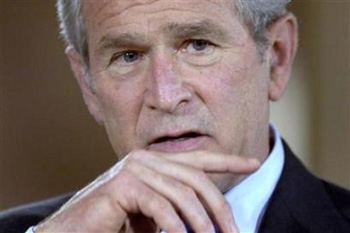Key White House ally says George Bush may have broken the law.
 Representative Peter Hoekstra of Michigan, the Republican chairman of the House Intelligence Committee, wrote to President Bush in May warning that the Bush administration may have broken the law by failing to inform Congress about several secret intelligence programmes, although he did not specify which intelligence activities he believed had been hidden from Congress.
Representative Peter Hoekstra of Michigan, the Republican chairman of the House Intelligence Committee, wrote to President Bush in May warning that the Bush administration may have broken the law by failing to inform Congress about several secret intelligence programmes, although he did not specify which intelligence activities he believed had been hidden from Congress.
After his recent criticisms of the administration, intelligence officials have appeared at two closed sessions briefings and their appearances seem to have eased, but not fully erased Mr Hoekstra's worries.
A copy of the four-page letter dated May 18, which has not been previously disclosed, was obtained by The New York Times.It would appear that even Bush's own side are becoming disenchanted by his obsession with secrecy.
"I have learned of some alleged intelligence community activities about which our committee has not been briefed," Mr. Hoesktra wrote. "If these allegations are true, they may represent a breach of responsibility by the administration, a violation of the law, and, just as importantly, a direct affront to me and the members of this committee who have so ardently supported efforts to collect information on our enemies."
He added: "The U.S. Congress simply should not have to play Twenty Questions to get the information that it deserves under our Constitution."
A spokesman for Mr. Hoekstra, Jamal D. Ware, said he could not discuss the activities allegedly withheld from Congress. But he said that Mr. Hoekstra remained adamant that no intelligence programs could be hidden from oversight committees.
"Chairman Hoekstra has raised these issues with the administration to ensure that the Intelligence Committee is able to conduct its job of oversight," Mr. Ware said. "Intelligence officials have committed to being forthcoming with Congress, and Chairman Hoekstra is going to hold them to their word."
Mr. Hoekstra's blunt letter is evidence of a rift between the White House and House Republican leaders over the administration's perceived indifference to Congressional oversight and input on intelligence matters. Mr. Hoekstra wrote that he had shared his complaints with House Speaker J. Dennis Hastert, Republican of Illinois, and that the speaker "concurs with my concerns."
Indeed, I can think of no President since Nixon who has evoked executive privilege as much as Bush and Cheney have done.
For man who promotes freedom as often as he does, Bush certainly doesn't apply that same love of "freedom" when it comes to freedom of information.
We're not allowed to even know who took part in meetings setting Dick Cheney's energy policy, far less what any of those who attended recommended.
Indeed, such is their obsession with secrecy - unless it's access to your phone records or bank details in which case secrecy simply doesn't exist - they have even gone as far as to limit access to the Presidential records of past Presidents.
The twelve-year restriction period for the papers of former President Reagan and his Vice President, George H.W. Bush, expired on the same day George W. Bush took office. But instead of permitting the Archives to release approximately 68,000 pages of previously restricted Reagan records that would otherwise have been opened to the public in February 2001, the White House ordered the Archives three times to postpone the release of the materials. Then, on November 1, 2001, President Bush issued an executive order that purports to make fundamental changes in the Presidential Records Act.It's tempting to think he's trying to cover up for Daddy but I won't be so facetious. What he is doing is operating the most secret administration in US history and doing his best to ensure that the population have as little right as possible to know what their government are doing in their name.
Under the executive order, if a former President or Vice President - or even a member of his family - objects to the release of any document on the ground of "executive privilege," the Archives is forbidden to release the document to the public. The same is true if the incumbent President asserts "executive privilege." The effect is to replace the Presidential Records Act’s limited 12-year restriction period with a potentially indefinite limitation on access.
Like most vampires, these guys don't like daylight.
Click title for full article.























No comments:
Post a Comment